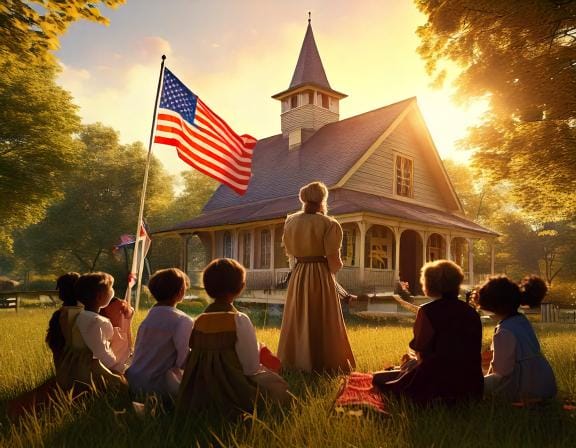
As another election day unfolds, it’s a moment to reflect on our civic duty and the principles that underpin our Constitutional Republic. While this blog isn’t about choosing a particular candidate, it’s about understanding and honoring the powerful responsibility we hold as citizens of a nation shaped by ideals centuries in the making. Voting isn’t just a right—it’s a duty, and one deeply rooted in a social contract that has evolved through the wisdom of thinkers and leaders who sought a government of the people, by the people, and for the people.
The Heart of a Constitutional Republic: We, The People
The foundation of our Republic is built upon the idea that “we, the people” are its vital components. The system only works if each of us plays our part. Our founding fathers created a structure that relies on active, informed citizens to maintain its integrity. Without our participation, the system’s very mechanics risk breaking down.
John Locke, often called the father of liberalism, believed in a social contract whereby governments derive their legitimacy from the consent of the governed. Locke argued that people, by agreeing to certain constraints, empower their government to protect their natural rights to life, liberty, and property. These rights, however, are safeguarded only when we, as citizens, remain engaged in the democratic process. Voting is the primary means by which we consent to be governed, express our preferences, and hold our leaders accountable.
Locke’s contemporaries, such as Montesquieu, also made significant contributions to our understanding of governance. Montesquieu’s concept of separation of powers—where legislative, executive, and judicial branches each keep the others in check—is a principle embedded in our own Constitution. By voting, we help preserve this balance of power, ensuring our rights are protected, and our government remains a reflection of the people it serves.
Our Constitution: A Mechanics Guide for Freedom
Our Constitution serves as a framework, a mechanics guide, if you will, that preserves our rights and delineates the responsibilities of each branch of government. While it grants powers to our leaders, it also limits them, ensuring that no single person or group can hold unchecked authority. Through voting, we continually shape and refine the course of our nation, safeguarding this balance.
Thomas Jefferson once said, “The will of the people is the only legitimate foundation of any government, and to protect its free expression should be our first object.” This vision of governance depends on our active engagement. Each vote is a voice in the collective story of our nation. It is through this act that we make choices, influence policies, and affirm our commitment to a government that truly represents us.
The Civic Duty to Educate Future Generations
Voting is not just about today—it’s also about tomorrow. Our duty as citizens extends to future generations, as we instill in them the importance of civic engagement and the values enshrined in our Constitution. Without this continued education, our republic risks losing relevance. By teaching our children the significance of voting, understanding the Constitution, and valuing their role as citizens, we update our nation’s “operating system,” equipping it to thrive in the future.

As John Adams warned, “Liberty cannot be preserved without a general knowledge among the people.” To honor his words, we must invest in civic education, ensuring that each generation understands their role and responsibility in shaping the nation. An informed youth is vital for a healthy democracy. When we participate in elections, we’re not just selecting leaders; we’re engaging in a process of learning and growth that strengthens our collective foundation.
The Legacy of Western Civilization: Democracy, Republicanism, and the Rule of Law
The legacy of Western Civilization has gifted us with essential ideals of democracy and republicanism, principles that date back to ancient Greece and Rome. While Athenian democracy introduced the concept of citizen participation, the Roman Republic established a complex system of checks and balances. These ideals greatly influenced the formation of modern representative democracies, where governance is conducted not by monarchs but by laws and elected representatives.
Another pillar of Western Civilization, the rule of law, ensures that justice and fairness are upheld, allowing individuals to live without fear of arbitrary rule. From the Magna Carta (1215) in England to the constitutional principles embedded in our own government, these ideals remind us of the value of justice, transparency, and accountability.
Philosophical Pillars and the Enlightenment’s Lasting Influence
Western thought has long been shaped by philosophical giants like Socrates, Plato, Aristotle, and later Enlightenment thinkers like Locke, Montesquieu, and Kant. Through rational inquiry and a commitment to ethics, these philosophers laid the foundation for governance and civic duty as we know it today. They understood that a society thrives when its citizens are free to pursue life, liberty, and happiness.
A Spiritual and Ethical Commitment to Our Nation
Our civic duty extends beyond intellectual engagement—it’s a moral and spiritual responsibility. Abraham Lincoln reminded us in his Gettysburg Address that ours is a “government of the people, by the people, for the people.” These words inspire us to participate not only as a right but as an obligation. Voting, then, is not just a choice—it’s a solemn duty that helps preserve the values, principles, and freedoms on which our nation was built.
A Final Call to Action

In this election season, let us honor the legacy of those who came before us by embracing our civic duty. As we cast our ballots, let us remember that voting is the bedrock of our republic. By doing so, we uphold the ideals of Locke, Jefferson, Adams, and Lincoln, ensuring that our government remains accountable and representative of its people. We participate not just for ourselves but for future generations, preserving a system that empowers individuals, values justice, and stands as a testament to human resilience.
Voting is more than a right; it is the lifeblood of our democracy. May we each rise to this noble challenge, standing together as stewards of this great nation.
